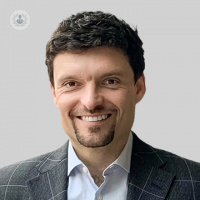Traumatic shoulder instability: Rehabilitation and recovery
Written by:In the second part of his comprehensive guide to traumatic shoulder instability, Mr Paolo Consigliere tells us about the rehabilitation and recovery process following treatment for traumatic shoulder instability.

What is the recovery process like after treatment for traumatic shoulder instability?
The recovery process after treatment for traumatic shoulder instability can vary depending on the severity of the injury, the type of treatment received (surgical or non-surgical), and individual factors such as age, overall health, and adherence to rehabilitation protocols. However, here's a general overview of what the recovery process might entail:
Immediate post-treatment phase:
Pain management: Patients may experience pain and discomfort immediately following a shoulder dislocation or its treatment, which can be managed with prescribed pain medications.
Immobilisation: Immediate post-injury immobilisation has mainly the aim to relieve pain and discomfort as there is no evidence that prolonged immobilisation reduces the risk of further events. If surgery was performed, the shoulder may be immobilised with a sling for a period, usually 4 weeks, to allow for healing of the repaired tissue.
Early rehabilitation phase (Weeks 0-6):
Passive range of motion: Physical therapy typically begins with gentle passive range of motion exercises to prevent stiffness and maintain joint mobility.
Pain and swelling management: Modalities such as ice therapy and elevation may be used to reduce pain and swelling.
Gradual strengthening: As tolerated, patients may start with gentle strengthening exercises for the muscles surrounding the shoulder joint. Isometric strengthening, muscle contraction against resistance without joint movement, is usually preferred in the initial phases to reduce the risk of overstretching the repair.
Intermediate rehabilitation phase (Weeks 6-12):
Active range of motion: Patients progress to active range of motion exercises, gradually increasing the intensity and range of motion.
Progressive strengthening: Physical therapy focuses on gradually increasing the strength and stability of the shoulder joint through targeted strengthening exercises.
Functional training: Patients begin to incorporate functional activities and sports-specific movements into their rehabilitation program.
Advanced rehabilitation phase (Weeks 12 and beyond):
Sport-specific training: Athletes may undergo sport-specific training to prepare for a return to their previous level of activity.
Continued strengthening and conditioning: Emphasis is placed on maintaining shoulder strength, stability, and overall conditioning to reduce the risk of re-injury.
Gradual return to activity: Patients gradually return to their normal activities and sports participation under the guidance of their healthcare provider, increasing intensity and duration as tolerated.
Throughout the recovery process, it's essential for patients to closely follow their doctor’s instructions and attend their scheduled physical therapy sessions to optimise outcomes and reduce the risk of complications. Additionally, patience and adherence to the rehabilitation program are crucial for a successful recovery from traumatic shoulder instability treatment.
Mr Paolo Consigliere is an esteemed consultant orthopaedic surgeon based in London, Keighley, Reading & Cranbrook. If you would like to book a consultation with Mr Consigliere you can do so today via his Top Doctors profile.


